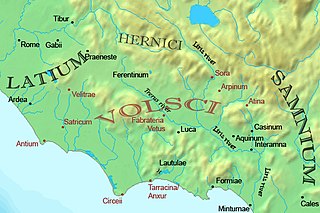Latin is an Italic language, originally spoken in ancient Rome and its empire.

Rome is the capital city of Italy. It is also the capital of the Lazio region, the centre of the Metropolitan City of Rome, and a special comune named Comune di Roma Capitale. With 2,860,009 residents in 1,285 km2 (496.1 sq mi), Rome is the country's most populated comune and the third most populous city in the European Union by population within city limits. The Metropolitan City of Rome, with a population of 4,355,725 residents, is the most populous metropolitan city in Italy. Its metropolitan area is the third-most populous within Italy. Rome is located in the central-western portion of the Italian Peninsula, within Lazio (Latium), along the shores of the Tiber. Vatican City is an independent country inside the city boundaries of Rome, the only existing example of a country within a city. Rome is often referred to as the City of Seven Hills due to its geographic location, and also as the "Eternal City". Rome is generally considered to be the "cradle of Western civilization and Christian culture", and the centre of the Catholic Church.
Roman or Romans most often refers to:

The Latins were originally an Italic tribe in ancient central Italy from Latium. As Roman power and colonization spread Latin culture during the Roman Republic, Latins came to mean mostly unified Italic Latin-speaking people and the Latin-speaking people of Italia, Gaul, Hispania and Dacia whose land was settled by Roman colonists.
Opus is a Latin word meaning "work". Italian equivalents are opera (singular) and opere (pl.).

The highest-ranking bishops in Eastern Orthodoxy, Oriental Orthodoxy, the Catholic Church, the Hussite Church, some Independent Catholic Churches, and the Church of the East are termed patriarchs.
A pontiff was, in Roman antiquity, a member of the most illustrious of the colleges of priests of the Roman religion, the College of Pontiffs. The term "pontiff" was later applied to any high or chief priest and, in Roman Catholic ecclesiastical usage, to bishops, especially the Pope, who is sometimes referred to as the Roman Pontiff or the Supreme Pontiff.

The Eastern Catholic Churches or Oriental Catholic Churches, also called the Eastern-Rite Catholic Churches, Eastern Rite Catholicism, or simply the Eastern Churches, are 23 Eastern Christian autonomous particular churches of the Catholic Church, in full communion with the Pope in Rome. Although they are distinct theologically, liturgically, and historically from the Latin Church, they are all in full communion with it and with each other. Eastern Catholics are a distinct minority within the Catholic Church; of the 1.3 billion Catholics in communion with the Pope, approximately 18 million are members of the eastern churches.
Antiquity or Antiquities may refer to:

Various lists regarding the political institutions of ancient Rome are presented. Each entry in a list is a link to a separate article. Categories included are: constitutions (5), laws (5), and legislatures (7); state offices (28) and office holders ; political factions and social ranks (8). A political glossary (35) of similar construction follows.

In classical architecture, a colonnade is a long sequence of columns joined by their entablature, often free-standing, or part of a building. Paired or multiple pairs of columns are normally employed in a colonnade which can be straight or curved. The space enclosed may be covered or open. In St. Peter's Square in Rome, Bernini's great colonnade encloses a vast open elliptical space.

The Baths of Diocletian were public baths in ancient Rome. Named after emperor Diocletian and built from 298 AD to 306 AD, they were the largest of the imperial baths. The project was originally commissioned by Maximian upon his return to Rome in the autumn of 298 and was continued after his and Diocletian's abdication under Constantius, father of Constantine.

The Basilica of St. Mary of the Altar of Heaven is a titular basilica in Rome, located on the highest summit of the Campidoglio. It is still the designated Church of the city council of Rome, which uses the ancient title of Senatus Populusque Romanus. The present Cardinal Priest of the Titulus Sanctae Mariae de Aracoeli is Salvatore De Giorgi.
Opera is a Western performance art which combines music and drama.
Classical education may refer to:
Latin culture may refer to:

The Western world, also known as the West, refers to various regions, nations and states, depending on the context, most often consisting of the majority of Europe, North America, and Oceania. The Western world is also known as the Occident, in contrast to the Orient or Eastern world. It might mean the Northern half of the North–South divide, the countries of the Global North.
The culture of Rome in Italy refers to the arts, high culture, language, religion, politics, libraries, cuisine, architecture and fashion in Rome, Italy. Rome was supposedly founded in 753 BC and ever since has been the capital of the Roman Empire, one of the main centres of Christianity, the home of the Roman Catholic Church and the seat of the Italian Republic. Due to its historical and social importance, Rome has been nicknamed the Caput Mundi, or "capital of the world".
Latin civilisation may refer to:








